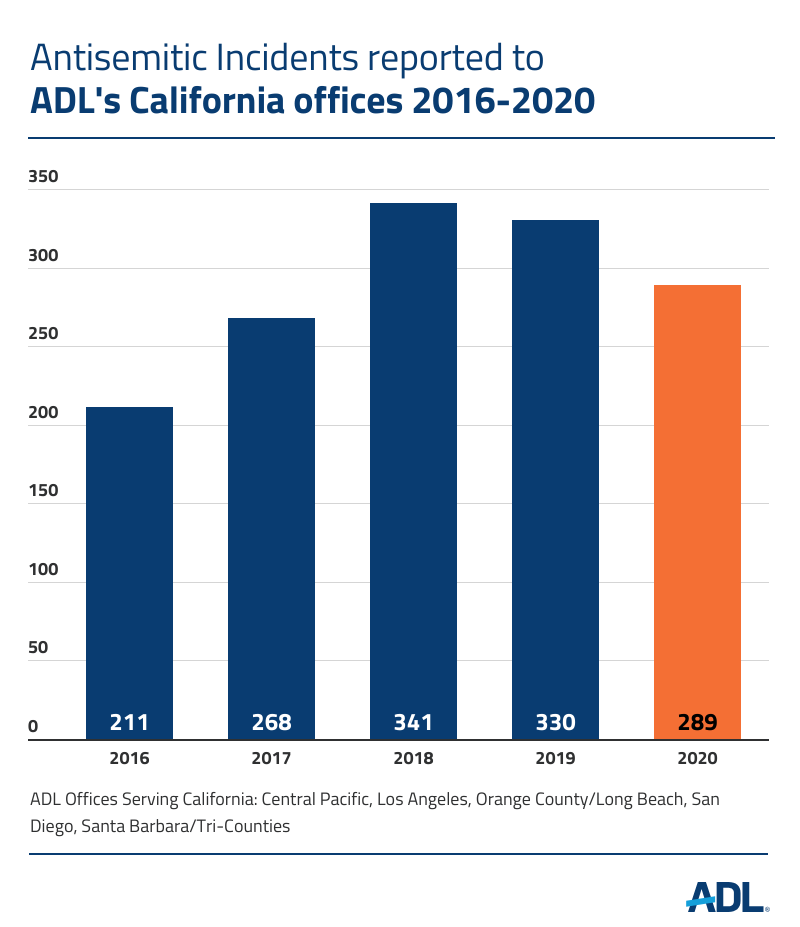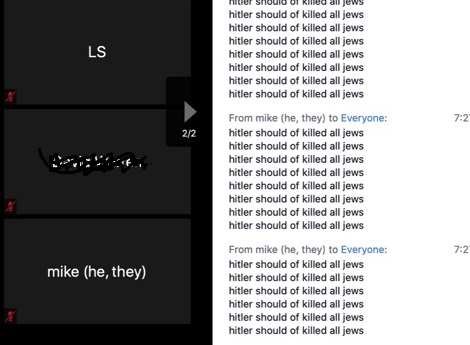
40% increase in California over past five years; 12% decline in 2020
Los Angeles, CA, April 27, 2021 … Antisemitic incidents remained at a historically high level across the United States in 2020, with a total of 2,024 incidents of assault, harassment and vandalism reported to ADL (the Anti-Defamation League). While antisemitic incidents declined nationally by 4% in 2020 after hitting an all-time high in 2019, last year was the third-highest year for incidents against American Jews since ADL started tracking such data in 1979.
The 2020 ADL Annual Audit of Antisemitic Incidents, issued today on the second anniversary of the deadly white supremacist attack on the Chabad of Poway, California, classifies incidents into three categories: (i) assault, (ii) harassment, and (iii) vandalism. In 2020, ADL recorded a total of 1,242 incidents of harassment, an increase of 10% from 2019. At the same time, during a year largely dominated by COVID-19 and lockdowns, reported acts of vandalism and assault declined by 18% and 49%, respectively. Additionally, no antisemitic fatalities were reported in 2020, the first year since 2017.
In California it was still the fourth-highest total of antisemitic incidents reported in the State since 1998 and while there was a 12% decrease in overall incidents compared to 2019, the high levels of incidents of harassment (177), vandalism (108) and assaults (4) remain disconcerting. When viewed as a five-year trend from 2016-2020, California experienced an increase in incidents of almost 40%.
“In California we continue to be concerned about historically high levels of antisemitic incidents,” said Jeffrey I. Abrams, ADL Los Angeles Regional Director. “Unfortunately, conspiracy theories surrounding the COVID-19 pandemic spread along with the virus, leading to not only the spread of antisemitic messages and memes, but sinophobic and general anti-Asian sentiment as well. We have worked locally and nationally in coalition with AAPI groups to track and counteract this rise in pandemic-related hate and will continue to do so as long as such hatred continues.”
“In California we continue to be concerned about historically high levels of antisemitic incidents,” said Jeffrey I. Abrams, ADL Los Angeles Regional Director. “Unfortunately, conspiracy theories surrounding the COVID-19 pandemic spread along with the virus, leading to not only the spread of antisemitic messages and memes, but sinophobic and general anti-Asian sentiment as well. We have worked locally and nationally in coalition with AAPI groups to track and counteract this rise in pandemic-related hate and will continue to do so as long as such hatred continues.”
The year was dramatically impacted by the spread of the COVID-19 pandemic, which led in some cases to Jews and other minorities being blamed or scapegoated for spreading the virus. After the pandemic became more widespread starting in March, incidents of antisemitism at schools and colleges dropped precipitously as learning moved online.
This led to an increase in incidents of antisemitic “Zoombombing” – the intentional disruption of live videoconferences named after the popular Zoom platform. In 2020, ADL recorded 196 incidents of antisemitic videoconferencing attacks. Of those incidents, 114 targeted Jewish institutions such as schools and synagogues.
“While any decline in the data is encouraging, we still experienced a year in which antisemitic acts remained at a disturbingly high level despite lockdowns and other significant changes in our daily lives and interactions with others,” said Jonathan A. Greenblatt, ADL CEO and National Director. “We can’t let our guard down. As communities begin to open up and people spend more time in person with others, we must remain vigilant.”
In 2020, ADL counted a total of 2,024 antisemitic incidents across the U.S., a 4% decline from the 2,107 incidents recorded in 2019. ADL’s Audit classifies incidents into three categories: (i) assault, (ii) harassment, and (iii) vandalism.
Of the total incidents reported in 2020:
Harassment: There were 1,242 harassment incidents nationwide in 2020, defined as cases where one or more Jews reported having been harassed by antisemitic language or actions, an increase of 10% from 1,127 in 2019. In California there were 177 incidents of harassment reported. Selected incidents of harassment reported to ADL Los Angeles in 2020 include:
- A Jewish boy was walking to synagogue on Shabbat when he was verbally harassed by an individual who told him to “get off the sidewalk because you’re a dirty, filthy Jew” and “go to hell.” (January, Los Angeles)
- In an apparent effort to harass neighbors, an individual hung a flag outside their home that contained a swastika. (March, Westchester) **picture available
- A non-Jewish neighbor verbally harassed and threatened Jewish neighbors telling them that Jews are spreading COVID-19. (April, Los Angeles)
- In an effort to harass neighbors, a resident displayed a swastika on their car. (May, Riverside County)
- Facebook user posted an antisemitic cartoon depicting a caricature of a Jew as “The Shadow Government” controlling the United States as a comment on an individual’s Facebook post. (July, Los Angeles) **picture available
- Members of Goyim Defense League, a group of antisemitic provocateurs, distributed antisemitic and fake Black Lives Matter fliers around a predominantly Black community. They also hung banners on a freeway overpass that read “Honk if you know…the Jews want a race war.” (August, Los Angeles) **pictures available
- During a parking dispute a Jewish person was spat on and told: “You Hasidic Jews always break the law.” (October, Los Angeles)
- Individual was threatened by another person who brandished a knife and said: “All Jews should be killed.” (November, Reseda)
Zoombombings:
- During a virtual Torah lesson held on Zoom, an unknown participant wrote the n-word and another unknown participant displayed “Mein Kampf” as their virtual background. Other unknown participants shouted, “Hitler did nothing wrong” and “Heil Hitler.” (March, Los Angeles)
- A synagogue’s Shabbat services on Zoom was disrupted by an unknown participant who drew swastikas on the digital prayer book. (April, Woodland Hills) **picture available
- A club’s Zoom meeting was disrupted by unknown participants who wrote antisemitic messages including “Hitler should of [sic] killed the Jews” and exposing themselves on camera. (October, Marina del Rey) ** picture available
Vandalism: There were 751 vandalism incidents nationwide, defined as cases where property was damaged in a manner that harmed or intimidated Jews. During a year dominated by COVID19 and lockdowns, acts of antisemitic vandalism decreased 18%, from 919 incidents in 2019. In California there were 108 incidents of vandalism reported, down from the 135 reported in 2019. Selected incidents of vandalism reported to ADL Los Angeles in 2020 include:
- A construction site was vandalized with the message “F**k Jews” in spray-paint. (February, San Pedro) **picture available
- A synagogue was defaced with graffiti that read, “F**k Kikes.” (April, Los Angeles) **picture available
- Jewish individual discovered that someone had carved “Jew” into a wooden post next to his front door. (May, Palm Springs)
- A synagogue was vandalized with graffiti that read “F**k Israel” and “Free Palestine.” (May, Los Angeles) **picture available
Assault: There were 31 incidents of assault nationwide, defined as cases where individuals were physically targeted with violence accompanied by evidence of antisemitic animus. Antisemitic assault decreased by 49% in 2020 from 61 in 2019. The assaults involved a total of 41 victims. No antisemitic fatalities were reported for the first year since 2017. In California there were 4 reported assaults, down from the 9 reported in 2019. Selected incidents of assault reported to ADL Los Angeles in 2020 include:
- A Jewish woman was called a “Jew bitch” and had eggs thrown at her by a passerby on the street. (January, Los Angeles)
- A man yelled “Hitler” and threw a water bottle at a group of yeshiva students. (September, Los Angeles)
Analysis of Nationwide Incidents
The 2,024 incidents were reported in 47 states, as well as the District of Columbia. The states with the highest numbers of incidents were New York: 336, New Jersey: 295, California: 289, Florida: 127 and Pennsylvania: 101. Combined, these states account for nearly 57% of the total number of incidents.
ADL’s Center on Extremism has gathered the complete data for 2020, as well as data from the previous two years, on ADL’s H.E.A.T. Map, an interactive online tool that allows users to geographically chart antisemitic incidents and events nationally and regionally.
In 2020, there were 327 reported incidents at Jewish institutions such as synagogues, Jewish community centers and Jewish schools, an increase of 40% from 234 in 2019. Of that total, 264
were incidents of harassment, 61 were incidents of vandalism and three were incidents of assault.
ADL’s Audit recorded 331 antisemitic incidents attributed to known extremist groups or individuals inspired by extremist ideology. This represents 16% of the total number of incidents. White supremacist groups were responsible for 277 antisemitic propaganda distributions. Other extremist activity included provocations by the Goyim Defense League, a loose network of individuals connected by their virulent antisemitism.
A total of 178 antisemitic incidents in 2020 involved references to Israel or Zionism, compared to 175 in 2019. Of those, 38 appeared in the form of white supremacist propaganda efforts, which attempt to foment anti-Israel and antisemitic beliefs. In January and February, antisemitic incidents in schools, colleges and universities were reported at significantly higher levels than they were during the same period in 2019. Those numbers dropped precipitously as educational institutions across the nation switched to remote learning during the COVID-19 lockdown.
“There was a marked decline of school-based incidents after March, when nearly all schools moved to fully remote learning, so the pandemic definitely played a role in shifting how and where antisemitism manifested in 2020,” Greenblatt said. “This was offset to some degree by the high number of Zoombombing incidents targeting Jewish people and other marginalized communities.”
The Audit offers a snapshot of one of the ways American Jews encounter antisemitism, but a full understanding of antisemitism in the U.S. requires other forms of analysis as well, including but not limited to public opinion polling, assessments of online antisemitism, and examinations of extremist activity, all of which ADL offers in other reports, such as ADL Global 100, Online Hate and Harassment: The American Experience, Survey on Jewish Americans’ Experiences with Antisemitism, Murder and Extremism in the United States in 2020, and the ADL Survey of American Attitudes Toward Jews.
How ADL is Responding
ADL has a comprehensive approach to addressing antisemitic incidents and behavior. This includes prevention efforts through youth education, as well as working to enact laws that will improve federal, state and local prevention tactics and response to antisemitic hate crimes and all forms of hate violence.
ADL also partners with law enforcement to raise awareness of extremist threats and help law enforcement professionals recognize and disrupt potential threats. ADL likewise provides education and training every day to students, reaching young people at a time when they are most vulnerable to bullying and social pressures. ADL works with victims and universities to respond to antisemitic harassment and other worrying incidents on college campuses. Finally, ADL’s No Place for Hate and Words to Action programs teach understanding and promote inclusivity in schools and on campuses, respectively.
In response to the historic rise in antisemitic incidents over the past four years, ADL has made the following policy recommendations:
- Public officials and civic leaders — from the President, to governors, attorneys general, mayors, other civic leaders, and law enforcement authorities — should use their bully pulpits to speak out against antisemitism and all forms of hate and extremism.
- Federal, state, and local authorities should provide funding for security hardening and enhancements for at-risk houses of worship, schools, community centers, and other nonprofit institutions. At a time of increased attention to white supremacy, antisemitism, extremist and hate-motivated violence, the federal government and states should significantly increase the Non-Profit Security Grant program funding and institutional security training and outreach.
- Governments should provide law enforcement officials with the tools and guidance they need to prevent and effectively identify, investigate and respond to hate crimes, while providing trauma-informed comfort and assistance to individual victims and community members. Additionally, law enforcement agencies should use data from the FBI, Department of Education, and NGOs such ADL and Stop AAPI Hate to anticipate where hate incidents are most likely to occur and to proactively contact community members and institutions to strengthen relationships and collaboration.
- Congress should give the Justice Department the tools it needs to support law enforcement agencies in strengthening their practices and capacity to investigate and report on hate crimes by enacting the Jabara-Heyer NO HATE Act. Congress can advance its goals by requesting an accounting from the Attorney General of law enforcement agencies’ hate crime reporting practices, and by directing state and local law enforcement assistance to programs and efforts that improve hate crime investigation, record-keeping and reporting.
- School districts should promote anti-bias, bullying prevention and Holocaust and genocide education programs in elementary and secondary schools. University leadership should respond firmly and forcefully to antisemitic acts on college campuses, including incidents that target Jewish students because of their actual or perceived support of the state of Israel.
- In response to the rising threat of domestic extremism in the wake of the Jan. 6 insurrection at our nation’s Capitol, ADL recently created the PROTECT plan, which outlines a comprehensive, bipartisan approach to address this pernicious threat.
The ADL Audit includes both criminal and non-criminal acts of harassment and intimidation, including distribution of hate propaganda, threats and slurs, as well as vandalism and assault. Compiled using information provided by victims, law enforcement and community leaders, and evaluated by ADL’s professional staff, the Audit provides a regular snapshot of one specific aspect of a nationwide problem while identifying possible trends or changes in the types of activity reported. This information assists ADL in developing and enhancing its programs to counter and prevent the spread of antisemitism and other forms of bigotry.
The Audit of Antisemitic Incidents is a project of ADL’s Center on Extremism, whose work is supported in part by the following generous donors as well as numerous others: The ADL Lewy Family Institute for Combating Antisemitism, Anonymous, Roman Abramovich, Catena Foundation, Charles and Mildred Schnurmacher Foundation, Crown Family Philanthropies, David Berg Foundation, Joyce and Irving Goldman Family Foundation, Lillian and Larry Goodman Foundations, The Marlene Nathan Meyerson Family Foundation, The Nancy K. Silverman Foundation, Nathan Cummings Foundation, New England Revolution Foundation, Quadrivium Foundation, Zegar Family Foundation.
ADL is a leading anti-hate organization. Founded in 1913 in response to an escalating climate of antisemitism and bigotry, its timeless mission is to protect the Jewish people and to secure justice and fair treatment for all. Today, ADL continues to fight all forms of hate with the same vigor and passion. ADL is the first call when acts of antisemitism occur. A global leader in exposing extremism, delivering anti-bias education and fighting hate online, ADL’s ultimate goal is a world in which no group or individual suffers from bias, discrimination or hate. More at www.adl.org.
In the News:





